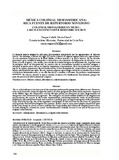Música Colonial Mesoamericana: Rica Fuente de Repertorio Novedoso

View/
Date
2016Author
Palabras Clave
Música colonial, Mesoamérica, Adoctrinamiento religiosoColonial music, Mesoamerica, Religious indoctrination
Metadata
Show full item recordAbstract
La llamada música antigua ha sido parte del repertorio interpretado por las agrupaciones de diversas épocas. Sin embargo, a inicios del siglo XX inicia el interés de algunas grupaciones por especializarse en este repertorio compuesto en la Edad Media, el Renacimiento o la época barroca. En las décadas posteriores, gran cantidad de intérpretes se dedicaron a este repertorio. El surgimiento de ediciones urtext
(fieles al texto original) y facsímiles, la reedición de tratados antiguos de ornamentación, la publicación de múltiples libros de interpretación, la construcción de instrumentos basados en modelos antiguos e infinidad de grabaciones dieron un impulso importante al movimiento. En la búsqueda por la novedad, uno de los aportes importantes de esta tendencia fue el descubrimiento de compositores y repertorio que
habían sido olvidados por siglos. En este contexto, algunos musicólogos volvieron su mirada a los archivos eclesiásticos latinoamericanos, y con ello dan inicio a estudios y ediciones de partituras completamente novedosos. En síntesis, durante la época colonial, la música fue fundamental. Inicialmente, porque fue parte del proceso de adoctrinamiento religioso.
Collections
Información Adicional
| Otros Títulos | Colonial Mesoamerican Music: A Rich and Innovative Rertoire Source |
| Correo Electrónico | maria.vargascullell@gmail.com |
| ISSN | 1690-3226 |
| ISSN Electrónico | 2244 - 842X |
| Resumen en otro Idioma | The so-called old music has been part of the repertoire performed by groups from different eras. However, in the early twentieth century it begins the interest of some groups to specialize in this repertoire composed in the Middle Ages, the Renaissance and the Baroque period. In subsequent decades, large numbers of interpreters were devoted to this repertoire. The emergence of Urtext editions (faithful to the original text) and facsimiles, the reissue of old treaties ornamentation, publishing numerous books of interpretation, building on old models based tools and countless recordings gave an important impetus to the movement. In the search for novelty, one of the important contributions of this trend was the discovery of composers and repertoire that had been forgotten for centuries. In this context, some musicologists turned their gaze to the Latin American church archives, and thus they begin studies and editions of completely new scores. In short, during the colonial era, music was fundamental. Initially, because it was part of the process of religious indoctrination. |
| Colación | 266-272 |
| Periodicidad | Semestral |
| Institución | Universidad de Los Andes |
| País | Venezuela |
| Publicación Electrónica | Academia |





